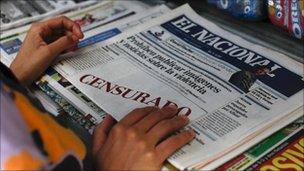Venezuela bans 'violent' photos in newspapers
- Published

On Wednesday, El Nacional's front page carried two boxes with the words "censored" written in red
A month-long ban has begun in Venezuela on national newspapers printing what a court ruling has called "violent, bloody or grotesque" images.
It comes after a furore over a front-page photograph in two publications of bullet-ridden bodies at a morgue.
The government says the move is to protect the country's children from exposure to such images.
But the newspapers say the move is an attack on the freedom of the press ahead of September's elections.
'Censored'
What started out as a dramatic front page splash has now developed into a nationwide debate on press freedoms and the high level of violence in Venezuela.
At the end of last week, El Nacional - a daily newspaper openly opposed to President Hugo Chavez - ran a photograph on its front page of a dozen or more bodies in the Bello Monte morgue in the capital, Caracas.
Taken in December, it was a grisly image with the young men's bullet-ridden bodies lying piled up on top of each other, some of them on the floor.
It was later re-printed in another opposition newspaper, Tal Cual.
It immediately sparked a furious response from the government of Mr Chavez over what it called "pornographic journalism".
An investigation was launched to see whether either paper broke the law in publishing the material.
On Tuesday, a special court for the protection of children and adolescents ruled that print media "should abstain from publishing violent, bloody or grotesque images, whether of crime or not, that in one way or another threaten the moral and psychological state of children".
The government later banned all national newspapers from running similar images for a month, singling out the two publications for particular criticism.
On Wednesday, in response to the measure, El Nacional carried two white boxes with the words "censored" written in red where their photos would normally have been.
The editor of El Nacional, Miguel Henrique Otero, defended his newspaper's decision to publish the images.
"The editorial aim of the photo was to shock people so that in some way they react to the situation, since the government does nothing," he told CNN.
The government says it is clamping down on irresponsible journalism.
However, with legislative elections a little over a month away, it seems clear that crime and the right to report it will be key issues for the opposition in their campaign.